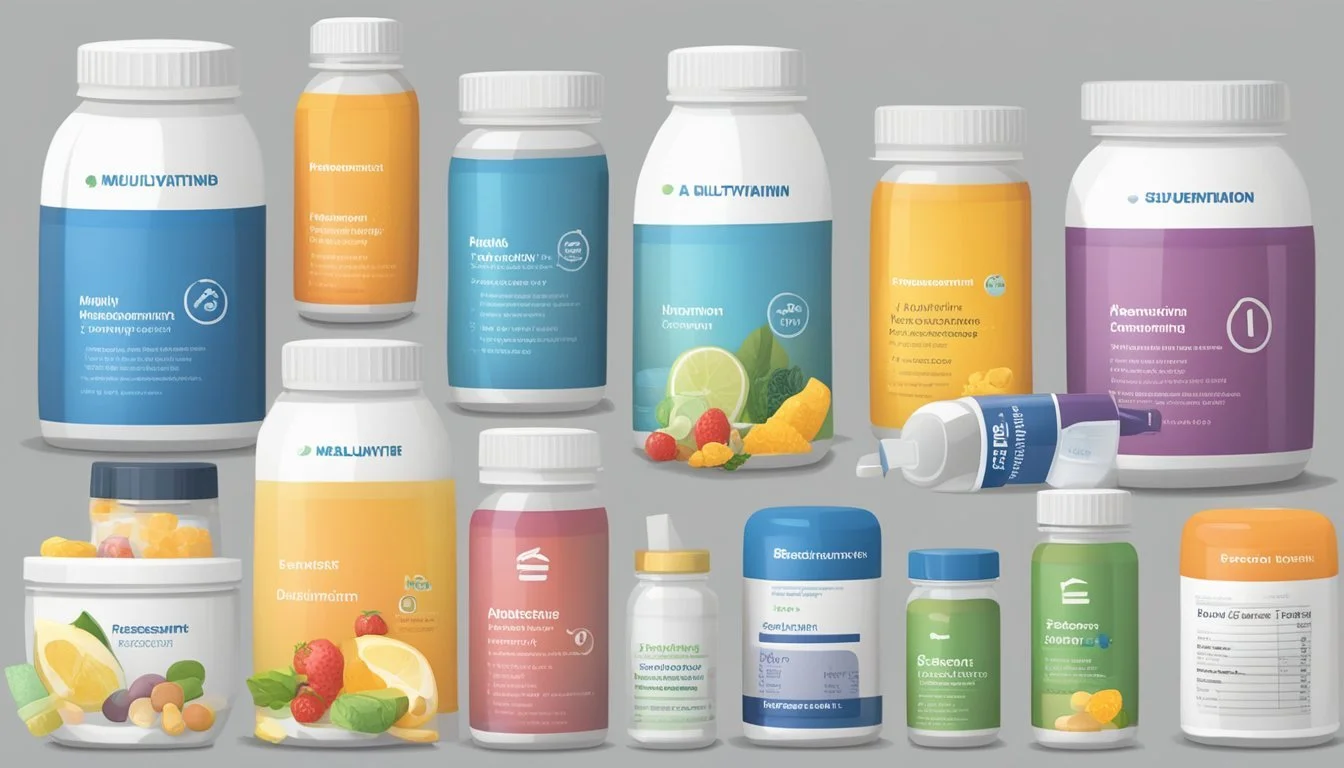How Many Servings of Key Nutrients Multivitamin Electrolytes Is Too Much
Understanding Safe Limits
Navigating the world of multivitamins and electrolytes can be challenging, especially when determining the right daily intake. With various options available, and individual needs differing, it's vital to know how many servings are too much. Overconsumption of supplements can lead to unwanted health issues, making accurate information crucial.
Nutritionists and registered dietitians often emphasize the importance of balancing electrolytes to support bodily functions such as hydration, muscle control, and energy production. Consuming more than the recommended daily servings of Key Nutrients Multivitamin Electrolytes can lead to an imbalance that affects your overall well-being. Tailoring your intake based on your activity level, diet, and individual health needs ensures optimal benefits without adverse effects.
Understanding how many servings are safe requires considering factors such as the concentration of each nutrient in the supplement, your existing diet, and your body's unique demands. Consulting with a healthcare professional can provide personalized guidance, helping you make informed decisions about your supplement regimen.
Understanding Electrolytes and Their Functions
Electrolytes are essential minerals that carry an electrical charge when dissolved in water. These include sodium, potassium, calcium, magnesium, chloride, and phosphate. Each of these plays a crucial role in maintaining the body's functions.
Sodium helps regulate fluid balance by controlling the amount of water in and around cells. It is also vital for muscle contractions and nerve signaling.
Potassium works closely with sodium to maintain fluid balance. It is essential for muscle contractions, nerve function, and regulating blood pressure.
Calcium is well known for its role in building and maintaining strong bones and teeth. Additionally, it aids in muscle contraction and ensuring a steady heart rhythm.
Magnesium is required for more than 300 biochemical reactions in the body. It assists in muscle function, nerve signaling, and maintaining a regular heart rhythm. Magnesium is also critical for strong bones.
Chloride works with sodium to maintain proper balance of bodily fluids. It is also a component of gastric juice, which is important for digestion.
Phosphate is involved in energy production and storage. It also helps in bone formation and the repair of tissues.
Electrolytes are crucial for promoting hydration. They help regulate the balance of fluids inside and outside cells, ensuring that the body functions efficiently. Proper levels of electrolytes are essential for muscle contractions, nerve signaling, and maintaining blood pressure.
Incorporating a balanced diet rich in these electrolytes can support various physiological processes, ensuring overall health and well-being.
The Importance of Proper Hydration
Proper hydration is essential for maintaining good health and optimal bodily functions. Water plays a critical role in everything from temperature regulation to joint lubrication.
Dehydration can lead to a host of problems. These range from mild symptoms like headaches and fatigue to severe issues such as heatstroke or kidney problems.
Maintaining fluid balance is key. Electrolyte drinks and sports drinks can be beneficial for replenishing essential minerals lost through sweat.
For active individuals, staying hydrated ensures better performance. Muscles and nerves function more efficiently when properly hydrated.
Drinking enough water helps maintain healthy skin. Well-hydrated skin tends to be more elastic and less prone to dryness.
Key Benefits of Staying Hydrated:
Supports physical performance
Helps with nutrient absorption
Aids in digestion
Regulates body temperature
Promotes healthy skin
Signs of Dehydration:
Dark urine
Dry mouth
Fatigue
Dizziness
Decreased urine output
Electrolyte drinks often contain sodium, potassium, calcium, and magnesium. These are crucial for maintaining fluid balance and preventing dehydration.
People on ketogenic diets may benefit from electrolyte supplements. This is because they might lose more electrolytes during the initial stage of the diet.
Proper hydration is not just about drinking water. Including a balance of electrolyte-rich fluids can enhance hydration and prevent imbalances.
Regularly consuming water and electrolyte drinks can help in staying hydrated. This is especially important for athletes, people in hot climates, and those engaging in strenuous activities.
Recommended Nutrient Intakes and Upper Limits
Recommended dietary allowances (RDAs) and adequate intakes (AIs) vary by age and sex. These values guide daily nutrient consumption to promote health.
The Daily Values (DVs) are used on dietary supplement and food labels. Here are some key nutrients:
Calcium: Adults aged 19-50 need 1,000 mg/day. The upper limit (UL) is 2,500 mg/day.
Vitamin C: Adults (male) need 90 mg/day; females need 75 mg/day. The UL is 2,000 mg/day.
Magnesium: Adult males need 400-420 mg/day; females need 310-320 mg/day. The UL from supplements is 350 mg/day.
Electrolytes such as sodium, potassium, and magnesium are crucial, especially in electrolyte powders.
Sodium intake should not exceed 2,300 mg/day. Higher amounts can lead to health conditions, including hypertension.
Individuals with kidney disease or those on specific medications must adjust nutrient intakes under medical supervision.
Electrolyte supplements can vary in sodium, potassium, magnesium, and calcium content. Ensure intake aligns with daily recommendations to avoid exceeding ULs.
The National Academies of Sciences, Engineering, and Medicine provides Tolerable Upper Intake Levels (ULs) to prevent adverse effects. Always review these limits when considering supplements.
Consult healthcare providers to tailor nutrient intakes, especially when considering electrolyte and multivitamin supplements. This ensures balance and avoids nutrient excesses.
Risks of Excessive Intake of Key Nutrients
Electrolytes
Consuming too many electrolytes can lead to serious health problems. High sodium intake can result in hypernatremia, causing dehydration, high blood pressure, and increased risk of heart failure. Conversely, excessive low sodium levels can cause hyponatremia, leading to headaches, nausea, and in severe cases, brain swelling.
Multivitamins
Overconsumption of multivitamins can strain the kidneys, as they work to clear excess vitamins from the body. High doses of vitamins A, D, E, and K, which are fat-soluble, can lead to toxicity. Symptoms may include nausea, headache, and more severe health problems such as liver damage.
Key Nutrients and Muscle Cramps
Imbalances in calcium, magnesium, or potassium can cause muscle cramps. Too much calcium might also lead to kidney stones, while excessive magnesium can cause diarrhea and other gastrointestinal issues.
Dehydration and Electrolyte Imbalance
An imbalance of electrolytes, such as too much potassium or too little sodium, can disrupt normal cell function. This can result in symptoms ranging from muscle weakness, cramps, and dehydration, to more severe conditions like heart arrhythmias.
Table: Potential Effects of Excessive Nutrient Intake
Nutrient Excessive Intake Risks Sodium Hypernatremia, high blood pressure, heart failure Potassium Heart arrhythmias, muscle weakness Calcium Kidney stones, impaired absorption of other minerals Magnesium Diarrhea, gastrointestinal distress Vitamins A, D, E, K Toxicity, liver damage
Maintaining the balance of nutrients is crucial for overall health. It is essential to monitor the consumption of these key nutrients through diet and supplements to prevent potential health risks.
Balancing Electrolyte Intake Through Diet
Balancing electrolyte intake is crucial for maintaining optimal health and bodily functions. Electrolytes such as sodium, potassium, and magnesium can be easily balanced through a well-rounded diet.
Fruits like bananas and oranges are excellent sources of potassium. Bananas offer roughly 400 mg of potassium per serving.
Vegetables including spinach and kale provide magnesium. A serving of spinach can contain around 157 mg of magnesium.
Whole foods offer multiple electrolytes. Sweet potatoes, for instance, are rich in both potassium and magnesium.
Nuts such as almonds deliver magnesium. A handful of almonds can provide about 80 mg.
Dairy products like yogurt and milk can help meet daily sodium and potassium needs. One cup of yogurt typically contains 150 mg of potassium.
Table of Common Electrolyte Sources:
Electrolyte Source Amount per Serving Potassium Banana 400 mg Magnesium Spinach 157 mg Sodium Yogurt 150 mg
Staying hydrated by drinking water also aids in electrolyte balance. Other beverages like coconut water offer a natural mix of sodium and potassium.
Incorporating a variety of these foods can ensure stable electrolyte levels and prevent imbalances. It’s advisable to avoid excessive intake of any single nutrient to maintain this balance effectively.
Eating a diverse range of foods is an effective strategy to balance electrolytes without relying solely on supplements. This approach can help manage daily intake and maintain proper bodily function.
Identifying Signs and Symptoms of Imbalance
Electrolyte imbalances can manifest through a variety of symptoms. Recognizing these signs early is crucial for addressing any potential health issues.
Common indicators include fatigue and confusion. Individuals may feel unusually tired or find it hard to concentrate.
Headaches and dizziness are also prevalent. These symptoms often stem from disturbances in the body's water balance.
Muscle cramps and weakness signal issues with electrolyte levels affecting muscle function. Irregular heartbeats or arrhythmias can occur, indicating a more serious imbalance affecting heart rate.
Dehydration-related symptoms include extreme thirst, headaches, and a rapid heart rate. Conversely, symptoms of overhydration or water intoxication include nausea and vomiting.
Tables can be helpful for quick reference:
Symptom Possible Cause Fatigue General electrolyte imbalance Confusion Dehydration, overhydration Headaches Dehydration, sodium imbalance Dizziness Dehydration, low blood pressure Muscle cramps Low potassium or magnesium Muscle weakness Low calcium, potassium, magnesium Irregular heartbeat Low potassium, magnesium Nausea and vomiting Overhydration, sodium imbalance Breathing difficulties Severe imbalance, typically sodium Seizures Severe sodium or calcium imbalance
Identifying these symptoms promptly can aid in determining whether there is an electrolyte imbalance. Appropriate treatment should follow to restore proper electrolyte levels. Remaining informed about these signs helps in maintaining overall health and well-being.
Special Considerations for Athletes and Active Individuals
Athletes and active individuals need to be particularly mindful of their electrolyte intake. During intense exercise, they lose electrolytes through sweat, which must be replenished to maintain hydration and energy levels.
Electrolyte drinks and multivitamin formulas are popular choices for replenishment. It's essential to recognize the body's specific needs depending on the activity. For example, marathon runners and endurance athletes may require higher electrolyte intake than those engaging in moderate exercise.
Fluid and Electrolyte Intake Guidelines:
Before Exercise:
2 to 4 hours before exercise: Drink 10.5 to 21 oz of fluid (1 1/3 to 2 2/3 cups) for a 150 lb individual.
During Exercise:
Adults: Drink 6 to 12 ounces every 20 minutes.
Teens (age 13 to 18): Drink 11 to 16 ounces every 20 minutes.
Kids (age 9 to 12): Drink 3 to 8 ounces every 20 minutes.
Key electrolytes such as sodium, potassium, magnesium, and calcium are crucial. These minerals support muscle function and nerve signaling.
Signs of Overconsumption:
Overconsumption of electrolyte supplements can lead to issues such as nausea, bloating, or imbalanced electrolyte levels. Monitoring intake is crucial, especially for those with high activity levels.
Staying informed and tailoring intake to match sweat loss and exercise intensity is important for optimizing performance and well-being.
Multivitamins and Electrolytes Supplementation Guidelines
When considering multivitamins and electrolyte supplements, moderation is key. It's important to understand the daily requirements and upper limits set by health authorities.
Multivitamins
Key Nutrients and Recommended Daily Allowances (RDAs):
Vitamin A: 900 mcg (men), 700 mcg (women)
Vitamin C: 90 mg (men), 75 mg (women)
Vitamin D: 15 mcg (600 IU) for adults up to 70 years
Vitamin E: 15 mg
Exceeding these RDAs daily from supplements can lead to toxicity. Consulting a registered dietitian or nutritionist can help tailor supplementation needs.
Electrolytes
Critical Electrolytes and Daily Limits:
Sodium: Ideal daily limit is 1,500 mg, with a maximum of 2,300 mg
Potassium: 3,500-4,700 mg
Magnesium: 400-420 mg (men), 310-320 mg (women)
Electrolyte supplements like powders can help in specific situations but should not be over-consumed. Always check labels to avoid excess intake.
Balancing Intake
Combining multivitamin and electrolyte supplements should be done cautiously. For example:
Multivitamin: One standard multivitamin typically covers most RDAs without excess.
Electrolyte Powder: Often used post-workout or during illness; should not replace a balanced diet.
Consulting healthcare professionals, such as a registered dietitian, ensures supplementation aligns with individual health needs and avoids excessive intake of any nutrient. This approach helps maintain balance and prevent adverse effects.
The Role of Lifestyle Factors on Nutritional Needs
Lifestyle factors significantly influence nutritional needs.
Exercise plays a crucial role. Individuals engaging in regular physical activity may require higher intakes of certain nutrients like electrolytes and proteins to support muscle repair and energy metabolism.
Climate affects hydration and nutritional requirements. Warmer climates may increase the need for water and electrolytes, while colder climates might alter metabolic rates and energy needs.
Activity level determines calorie and nutrient needs. Those with high activity levels need more calories and a balanced diet rich in vitamins and minerals to sustain energy and health.
Overall health impacts nutrient absorption and requirements. People with specific health conditions such as diabetes or heart disease may require tailored nutrient intakes.
Diet plans must be adjusted accordingly to meet different needs. A balanced diet rich in fruits, vegetables, whole grains, and lean proteins can ensure sufficient nutrient intake.
Hydration levels are critical. Proper hydration helps in nutrient transportation and digestion. Inadequate hydration can impair many bodily functions, including nutrient absorption.
Weight management through appropriate diet and exercise is essential. Overweight or underweight individuals may need specific nutrient adjustments to support healthy weight management.
Regular consultations with healthcare providers can help customize nutrient intake based on individual lifestyle factors and nutritional needs.
Choosing and Using Electrolyte Supplements Wisely
When selecting electrolyte supplements, it's essential to consider personal hydration needs, activity levels, and dietary restrictions. Products like Key Nutrients Electrolyte Recovery Plus offer balanced options but require careful evaluation.
Pay attention to labels. Look for supplements that are sugar-free and low in calories. This helps avoid unwanted weight gain and supports overall nutrition goals.
Consulting a nutritionist or registered dietitian is one of the best steps for personalized advice. They can help determine the right serving size and frequency based on individual health conditions and activity levels.
Avoid overconsumption. Moderation is key. For those using electrolyte powders or drinks, more isn't always better. Consuming too many servings can lead to imbalances, particularly with sodium and potassium levels.
Monitor hydration levels. Regularly assess how the body responds to the supplements. Overhydration or dehydration can affect performance and health. Adjust intake accordingly.
Using a table can help compare various electrolyte supplements:
Brand Calories/Serving Sugar-Free Cost/Serving Key Nutrients Electrolyte Recovery Plus 0 calories Yes $0.45 Nuun Hydration Tablets 15 calories Yes $0.90 Liquid I.V. Hydration Multiplier 45 calories No $1.25
Variety and balance are vital. Not all supplements are the same, so alternating between types, such as powders and drinks, can provide a more balanced intake of essential nutrients. Always prioritize products with fewer additives and artificial ingredients.
Navigating the world of electrolytes effectively ensures better hydration and overall well-being.
Monitoring Health: When to Seek Professional Advice
Excessive consumption of multivitamin electrolytes can lead to electrolyte imbalance. This imbalance can affect heart rhythm, muscle function, and hydration levels. Monitoring these aspects is crucial to avoid adverse effects on health.
Key Indicators to Watch:
Heart Rhythm: Irregularities in heartbeats may signal an electrolyte issue.
Muscle Function: Cramping, twitching, or muscle weakness can indicate imbalances.
Hydration Levels: Overhydration or persistent thirst may result from improper electrolyte consumption.
General Well-being: Fatigue, dizziness, and confusion are red flags.
Consulting Professionals: It's advisable to consult a registered dietitian or nutritionist. They can assist in maintaining the right dietary balance and proper electrolyte levels. They provide tailored advice based on physical activity, age, and overall health.
Seeking Medical Help: Immediate medical help is crucial if experiencing severe symptoms like chest pain, severe weakness, or persistent vomiting. These could be signs of significant electrolyte disturbances that need prompt intervention.
Recommended Actions:
Keep track of any unusual symptoms.
Regularly check hydration and thirst status.
Balance electrolyte intake with your diet and activity level.
A reactive approach to monitoring health can prevent complications and ensure proper maintenance of the body's essential functions.
Remember: Always adhere to recommended dosages unless guided otherwise by a healthcare professional.











